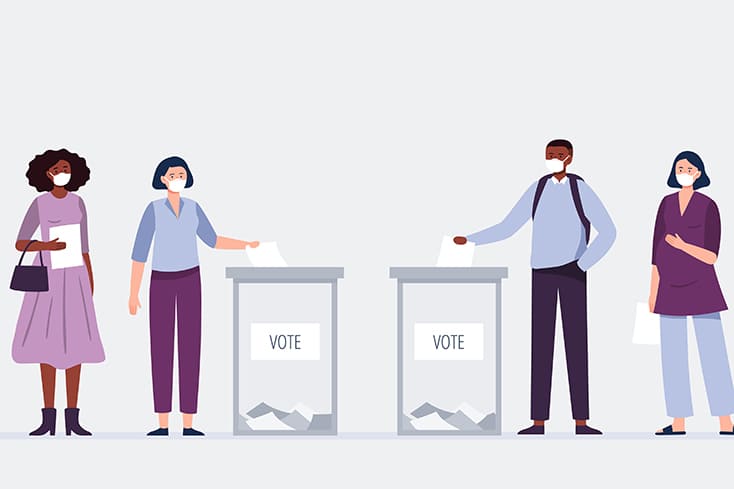October 21, 2020
By W. J. T. Mitchell

Mental health touches most policy issues in some way. Regardless of our personal experience with mental illness, we all have a duty to consider the numerous ways that our political power — our vote — can alter the lives of others.
Here are four reasons why I #Vote4MentalHealth.
1. It’s Personal
My son, Gabriel, was diagnosed with schizophrenia at age nineteen and died by suicide just before his thirty-ninth birthday. His life would undoubtedly have been much shorter and less productive without government and organizational support.
With the help of Social Security disability benefits and organizations like NAMI and Illinois’s Thresholds agency, he was able to transition into programs of work and education that provided almost twenty years of meaningful adult life. There was no magic bullet, and there are problems with all programs for people with mental illness, but without these supports, Gabe’s life would have been much more difficult.
2. It’s Economic
My family’s employer-based health insurance paid for Gabriel’s medical bills, but programs like the Department of Housing and Urban Development’s Section 8 program provided a housing subsidy to prevent him from becoming homeless. His Social Security benefits allowed him to work part-time as a grocery clerk while pursuing his dream of becoming a filmmaker. Without the support of government programs, it is unlikely that Gabriel would have survived the dangers of substance abuse and poverty as long as he did.
The cost to society of untreated mental illness in terms of addiction, homelessness and poverty is also much greater than the cost to support preventive care and services for people who need them. Despite what beneficial government programs exist, in the U.S., a country without universal health care, a significant burden of mental health services falls on charities, corporations and private citizens.
Public health is everyone’s business and should be a fundamental concern of the state. Mental illnesses do not just affect the individual, but families, communities and even whole economies.
3. It’s Moral
Caring for others is a fundamental obligation of a civilized society. Regardless of your religious or ideological leanings, it’s the right thing to do. The notions of “survival of the fittest” and “every man for himself” have unfortunately become embedded in the fabric of our nation, despite being deeply immoral and damaging to community solidarity.
We are our brothers’ and sisters’ keepers. In this time of a global pandemic, we put on masks to protect our neighbors from infection; we must take off the masks of indifference to protect their mental health. Would we leave a person experiencing a heart attack to die in the street, turning the other way as it happened? I hope the answer is “no” — that we would feel a human compulsion to do what we could to help.
4. It’s Constitutional
A vote may seem like a small thing, the expression of an individual preference for a candidate or a policy. But — especially when it comes to mental health — it is so much more than that. Voting is, in itself, the foundational act of a constitutional democracy. It is not just about individual mental health, but the health of the nation.
The Founding Fathers in fact regarded the American Constitution, with its separation of powers, as modelled on the structure of a mentally healthy individual. The mixed constitution of executive, legislative and judicial faculties mirrors the psychological balance of will, reason and judgment in the individual person. Healthy democracies depend upon a balanced constitution that makes self-government possible, just as a skilled psychotherapist helps a patient achieve balanced self-governance, and avoid impulsive decisions or self-destructive behavior.
Voting is an act, one hopes, of rational, well-informed deliberation, good judgment and the right to join in expressing “the will of the people.” When you cast your ballot this fall, vote as if not only the mental health of your friends and family is at stake, but also the mental health of the country.
W. J. T. Mitchell is the author of Mental Traveler: A Father, a Son, and a Journey through Schizophrenia (2020). He is the author many books, including Seeing Through Race, Cloning Terror, and Image Science. He is currently working on new book entitled Seeing Through Madness.
We’re always accepting submissions to the NAMI Blog! We feature the latest research, stories of recovery, ways to end stigma and strategies for living well with mental illness. Most importantly: We feature your voices.
LEARN MORENAMI HelpLine is available M-F, 10 a.m. – 10 p.m. ET. Call 800-950-6264,
text “NAMI” to 62640, or email. In a crisis, call or text 988 (24/7).